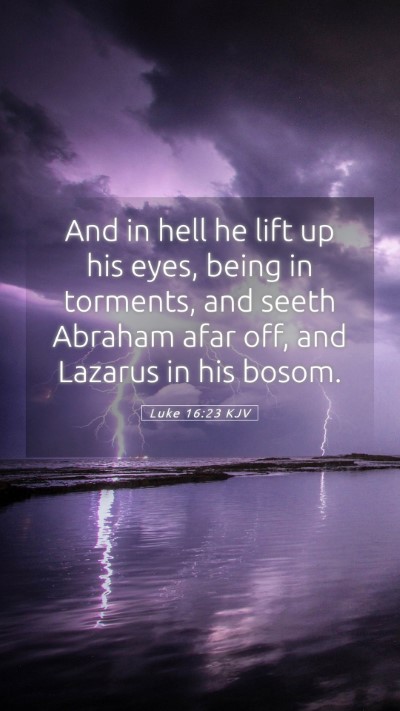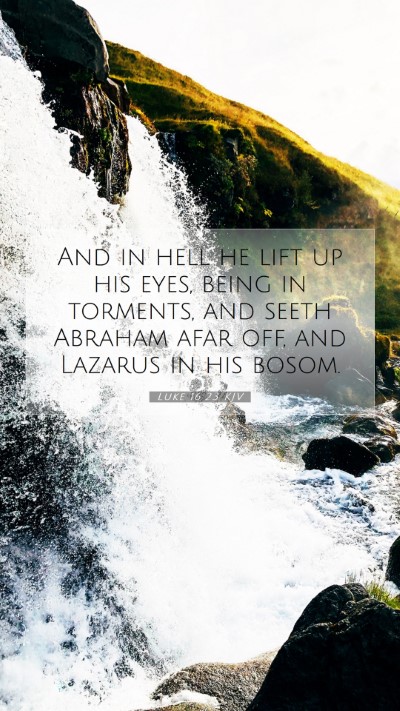Understanding Luke 16:23
Luke 16:23 says: "And in hell he lift up his eyes, being in torments, and seeth Abraham afar off, and Lazarus in his bosom."
This verse comes from the parable of the rich man and Lazarus, a significant story that illustrates profound spiritual truths regarding the afterlife, divine justice, and the fate of souls. Below, we will explore a comprehensive analysis of this verse using insights from esteemed public domain commentaries.
Verse Context
This scripture is set in the context of Jesus' teachings about wealth and its spiritual implications. The parable portrays the contrast between the lives of the wealthy and the poor, highlighting themes of compassion, justice, and the consequences of one's earthly choices.
Commentary Insights
Matthew Henry's Commentary
Henry emphasizes that this passage reveals the reality of hell—a state of conscious torment. He points out that the rich man, despite his luxurious life, ends up in misery, illustrating the transient nature of earthly wealth and the eternal significance of one's spiritual condition.
Albert Barnes' Notes
Barnes notes that the rich man's recognition of Abraham and Lazarus symbolizes a stark awareness of one's condition after death. He stresses that the “torments” mentioned signify an undeniable, painful realization of separation from God and the comforts of heaven, echoing the teaching that one's actions in life have eternal ramifications.
Adam Clarke's Commentary
Clarke expands on the imagery of Lazarus being in the “bosom of Abraham,” indicating a place of honor and comfort in heaven. He explains that this signifies the ultimate reward for those who suffer on earth and points to the reversal of fortunes in the afterlife, an essential theme in Jesus' teachings about the first being last and the last being first.
Theological Implications
The theological implications of this verse are multifaceted:
- The reality of eternal punishment: Luke 16:23 underscores the notion that hell is not merely a metaphor but a real state of being for those who reject God's ways.
- The comfort of the faithful: The depiction of Lazarus in Abraham's bosom symbolizes eternal rest and reward for faithfulness and righteousness.
- Awareness in the afterlife: The rich man's ability to see and recognize Abraham and Lazarus indicates an ongoing consciousness and awareness of one's fate post-mortem.
Bible Cross References
Luke 16:23 can be cross-referenced with the following scriptures:
- Luke 12:4-5 - Jesus speaks on fearing God rather than man, indicating the importance of eternal rather than temporary life.
- Matthew 25:46 - This verse highlights the eternal consequences of one's choices regarding faith and righteousness.
- Revelation 20:10 - Discusses the ultimate fate of the devil and his followers, emphasizing the reality of torment.
- John 5:28-29 - Talks about the resurrection of the dead, where all will be judged based on their deeds.
Applying the Verse to Daily Life
Understanding Luke 16:23 can serve as a profound reminder for believers:
- Focus on eternal values: The rich man's experience teaches that earthly wealth and status are not enduring. Prioritizing spiritual growth and compassion is essential.
- Consider the suffering of others: The parable encourages us to extend kindness to those in need, reflecting Christ's love.
- Reflect on one's own spiritual state: This verse prompts self-examination regarding one's relationship with God and preparedness for eternity.
Conclusion
In conclusion, Luke 16:23 offers deep spiritual insights into the consequences of our earthly lives and the importance of aligning our values with God’s teachings. Through the analysis of this verse, we find both a warning and a beacon of hope, as we are called to reflect on our choices and their eternal impacts.


